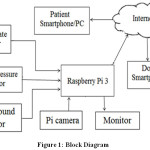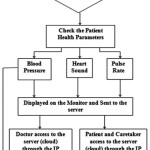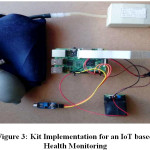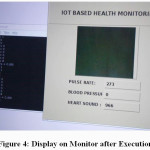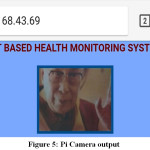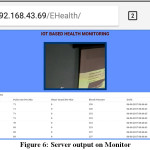Dr. E.N. Ganesh
Dean VISTAS Chennai
Corresponding Author E-mail: Enganesh50@gmail.com
DOI : http://dx.doi.org/10.13005/ojcst12.01.03
Article Publishing History
Article Received on : 30-11-2019
Article Accepted on : 25-02-2019
Article Published : 07 Mar 2019
Article Metrics
ABSTRACT:
Health Monitoring system using IOT describes the collection and interoperation of Patient data collected from the sensors from the hospitals through IOT Technology. The collected sensor data will support the doctor in the emergency situation for the betterment and improvement of Patient health. The hardware platform to implement the project consists of a sensor and Raspberry Pi 3 Model B equipped in a way to communicate with a doctor through the Internet and Smart Phone. This proposed idea will help doctors to know about the state of patient health and monitor anywhere in the world. In this proposed idea the sensors gather the medical information of the patient that includes patient’s heart rate, blood pressure, and pulse rate Then using the camera the patient is livelily monitored through the Raspberry kit and this information is sent to the Internet and stored in a medical server. The doctor and patient can monitor the patient data from any place of the world through the provided IP server address anytime. The emergency alert is sent to the patient if the sensor value is exceeded by the threshold data. Thus the patient's health parameters are watched lively and regular monitoring through the medical server to a doctor will help to make an effective diagnosis and almost accurate care can be given. The data collected through the IOT will help the patient to recover easily and also enhanced medical care can be given to the patients at a low cost.
KEYWORDS:
Healthcare; Health Monitoring; IoT; Medical Services
Copy the following to cite this article:
Ganesh E. N. Health Monitoring System using Raspberry Pi and IOT. Orient.J. Comp. Sci. and Technol; 12(1).
|
Copy the following to cite this URL:
Ganesh E. N. Health Monitoring System using Raspberry Pi and IOT. Orient.J. Comp. Sci. and Technol; 12(1). Available from: https://bit.ly/2NOEa0N
|
Introduction
The Internet of Things is a rising topic of social, economic and technical significance. Internet of Thing using sensors, Processors and Microcontrollers with accessories used for communication through the internet and becoming the constitutive part of the Internet, it is built with a suitable protocol which helps the interacting and communicating with each other and with the users respectively. This communication through the internet helps to find many applications which are developed based on IoT technology in which every physical object like sensor devices are connected to the internet.1 Healthcare plays a major role in the Internet of things which reduces the difficulty faced by patients and doctors. The homecare is provided instead of the expensive clinical care and prevention is provided by the efficient healthcare service. This service will help every individual by following basic healthcare, which leads to more advantageous results.2 IOT technology is increasing to support the cost and quality of patient life and also ensures the life span of patients with proper medication. In conventional health care undetected health problems can be solved through this IoT Technology thereby ensures healthcare services by maintaining a digital identity for each patient complication can be greatly reduced. The communication between the health sensors device with the computer or smartphone which has the default ability to communicate with the server which makes the whole system cost reduction and the complexity of the system is also reduced. Hence the system can also be made IoT enabled and Machine TO Machine compatible.3 Here the proposed paper show reliable continuous monitoring by the doctor, a solution of patients anywhere in the world based on a healthcare monitoring system can be checked. The patients carry a set of body sensors to collect their body parameters.
Rest of the paper is organized as follows. In Section II, Related Work is discussed. Section III proposed a system. Section IV, implementation and results. Finally, Section V concludes the paper along with further research and references.
Literature Survey
In1 Ravi Kishore Kodali et al., proposed the healthcare monitoring which is implemented to check the temperature of the patient. The Zig Bee mesh protocol is used where the patient 24-hour care records are being monitored. In-hospital records are maintained in the cloud. IoT empowered devices at the same time enrich the quality of care with regular monitoring and collection of data actively and moderate the cost of care and analysis of the same. In2 Jasmeet Chhabra et al., proposes the plan and implementation for emergency medical services based on IoT health monitoring system. In this project, the patient health-related problems and healthcare cost are reduced. The collection, recording, analyzing and sharing data streams through the internet which reduces the patient problem of visiting the doctor every time to check the health parameter like heartbeat rate, temperature and blood pressure. In3 Thirumalasetty Sivakanth et al., presents a reconfigurable sensor network for essential health checking. The possibility of patients collapse and the life-threatening consequences is reduced in content and real-time health monitoring system. The 566 International Conference on Signal, Image Processing Communication and Automation – complete information of the patient is being mechanically obtained by the doctor by NFC technology. Biosensors interfaced with the microcontroller will screen the patient’s imperative health. If any of the sensor’s preset threshold value is overdone above, a sensor’s value will be sent to doctors and the patient’s caretaker through the message. In4 Y. T. Zhan et al., presents the implementation of telehealth systems for the elderly population and discussion on various chronic diseases and their importance. They discussed in detail about wearable technology for remote health care system. In5 A. Murray et al., presents the planning of modern medicine, effective and safe use of healthcare technology as essential for any healthcare system. Concerns about medical equipment care have been raised up. There is a need to discuss the progress of the health care system, In this paper, significant progress in the implementation of the healthcare system is proposed. Also, the lack of medical equipment safety measures and the protective steps that need to be taken care to improve the quality of healthcare is discussed. In6 Saed Tarapiah et al., presents the paper which guarantees to decrease the cost of the system and overall improvement in the quality of health care services. It is a system that can measure heart rate and body temperature and communicate with them in case of accidental behaviour to manage medical personnel using GSM, GPS and web technologies to achieve immediate action to save the patient’s life. In7 Dr K N Muralidhara and Bhoomika. B.K present the design for IoT smart healthcare system using the microcontrollers. In this, the pulse oximeter, the temperature sensor and the heart rate are designed for the patient and the microcontroller to send data through the wireless network protocol and the data also shows the patient displayed on the LCD screen who knows his health status. The experts can see the information that logs the log to the HTML site of the page using IP address and page recovery methods that are so persisted by the information collection. So the continuous patient’s check framework is composed.
In8 D. Mahesh Kumar presents health systems based on wireless sensor networks. The wide range of benefits of wireless technology for the medical staff, patients and the continuous monitoring of the community, early detection of abnormal situations and potential knowledge found in the past data inserted all the information collected. The system helps the health care staff to control the complete state of the patient in a separate, real-time and great way. Through the network can reach every node of the patient at any time as long as the network terminal is available. The patient sends a set of sensors to collect their body parameters. The medical staff evaluates the overall condition of each patient and checks the collected values of the nodes. Luciano Tarricone et al.,9 the paper suggests, IoT-aware, an architecture for tracking of patients, automatic checking, and biomedical devices within nursing institutes and hospitals. Sampada Sathe and Alok Kulkarni,10 paper attempts to evaluate and understand the application of IoT in personalized care for the realization of excellence in health care costs within reasonable limits. Here it describes how IoT’s functions and how to use it in the use of remote sensing technology and wireless technology to achieve health care requirements.
Proposed System
A health monitoring system consists of several sensors connected to a patient and they communicate the data through the processing unit. In the project, Raspberry Pi is used as a data aggregator as well as a processor. The patient and doctor smartphone/computer are used as a monitoring system.
As in figure 1, the sensors system is used to obtain the information or readings from the patient and the reading which is read is converted into signals. These signals are provided for processing to Raspberry Pi, which is the IoT module. The Pi then displays the information on a Monitor and also stores the information over the cloud. This information can be accessed by the doctor on his phone/computer and get the information. If any emergencies, the patient is sent an alert automatically through the mail for medical medication.
The flow diagram of the project is shown in figure 2, the sensors value are read and displayed on the monitor and stored in the cloud for future use. If blood pressure sensor output is above 120 an alert mail is sent to the patient automatically to consult the doctor.
Implementation and Result
The kit implementation for Health Monitoring System is shown in figure 3. The Mouse and Keyboard connected to the USB port of Pi and the Monitor connected to the HDMI video port. The sensors connected to the GPIO pin through which the data from the Pi is transferred to the server and the patient can monitor the data on the monitor.
Figure 4 shows the display of the health monitoring system on the patient’s monitor. After the use of the pulse rate, blood pressure and heart sound sensor, the digital output from the sensor through the Pi is displayed on the Monitor.
The Pi camera output is displayed on the server, the IP address of the server is the same as the IP address of the raspberry pi. The camera output is shown in figure 5.
The Sensors output is displayed on the server, the IP address of the server is the same as the IP address of the raspberry pi which is shown in figure 6. This is a database where the patient’s health report is stored for future requirement by the doctor and the patient. If the patients’ blood pressure >120 an alert mail is sent to the patient by the doctor for the medical medication.
Conclusion
IoT Technology is an integration of various technologies which enables different devices and objects to interact with each other and use different network technologies. The proposed system gives better and effective health care services to patients and the information collected is networked worldwide through internet and communication devices in turn connected to cloud services and doctors can use this data and provide a quick and effective solution. The proposed model is a well-equipped system where the doctor can check his patient anywhere, anytime. Emergency alert e-mail is sent to the patients if the threshold value is reached to consult the doctor. This system is helpful for patients who are advised for the complete bed rest and the paralyzed patients, where the doctor can physical monitored the patient from the home with the help of the Pi camera which is used in the system. The aim of the proposed framework is to adopt a new production of medical systems that can provide health care services for high quality and low-cost patients using this combination of large data analysis, cloud computing, and computing technologies. The enhancement for the designed system will connect more sensors and connect all the objects to the Internet for quick and easy access. Further enhancement of the existing model can also be deployed as a mobile application in order to become easy to access the model around the world. The mobile application can be enhanced with the ambulance services, doctor’s list, nearby hospitals. The patients who are advised for the complete bed rest and the paralyzed patients can also be monitored and given precautions by the doctors by visual and audio by using the Pi camera. The system is implemented for one-to-one access, which can be implemented for many by giving a unique id for each member/patient in the home or the hospital.
Acknowledgements
We are very much thankful to the Management of VISTAS Pallavaram for funding this project.
References
- Swamy G., Kodali R. K., and Lakshmi B. “An Implementation of IoT for Healthcare”, IEEE Recent Advances in Intelligent Computational Systems (RAICS) 10-12 December 2015.
- Gupta P., Agrawal D., Chhabra J., Dhir P. K. “IoT based Smart HealthCare Kit”, Jaypee University of Information Technology, International Conference on Computational Techniques in Information and Communication Technologies (ICT ICT), 2016.
- Thirumala settee Sivakanthand S. Kolangiammal, “Design of IoT Based Smart Health Monitoring and Alert System”, I J C T A, 9(15), 2016, pp. 7655-7661.
- Tai B., and Hung K., Zhan Y. T., “Wearable medical devices for tele-home healthcare,” IEMBS’04. 26th Annual International Conference of the IEEE, 2004; vol. 2, pp. 5384–5387.
- Murray A., and Khambete N. D. “National efforts to improve healthcare technology management and medical device safety in India,” 7th International Conference on, IET, pp. 1–5, 2012.
- Atalla S., Aziz K., Ismail S. H., and Terapia S. “Smart Real-Time Healthcare Monitoring and Tracking System using GSM/GPS Technologies”, 2016 3rd MEC International Conference on Big Data and Smart City.
- Dr Muralidhara K. N., and Bhoomika B.K. “Secured Smart Healthcare Monitoring System Based on IoT”, International Journal on Recent and Innovation Trends in Computing and Communication Volume: 3 Issue: 7.
- Kumar D. M. “Healthcare Monitoring System Using Wireless Sensor Network” Int. J. Advanced Networking and Applications (2012); Vol.4 No.1: 1497-1500.
- Tarricone L., Mainetti L., Catarinucci L., Danilo de Donno, Stefanizzi M. L., Patrono L., and Palano L. “An IoT-Aware Architecture for Smart Healthcare Systems”, IEEE Internet Of Things Journal, December 2015; Vol. 2, No. 6.
- Sathe S., and Kulkarni A. “Healthcare applications of the Internet of Things: A Review” International Journal of Computer Science and Information Technologies (IJCSIT), 2014; Vol. 5 (5): 6229-6232.

This work is licensed under a Creative Commons Attribution 4.0 International License.

